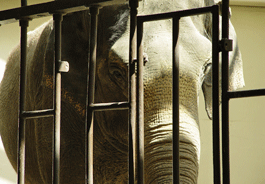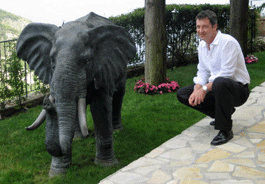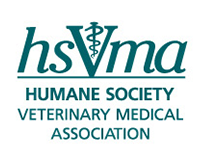Abuse Under the Big TopOctober 6, 2009 By John G. Hynes, DVM Like most of us, I became a veterinarian because I wanted to help animals. But after fifteen years of practice, I realized there was so much more I could and should be doing in the interest of animals. It took seeing a video of circus elephant abuse to move me to action. Old Habits Die Hard Intelligent and social creatures, performance elephants are often confined and handled inhumanely. The abuse of elephants and other wild animals in circuses is as old as the circus itself. We usually see circus elephants performing ridiculous tricks and taking commands, then being restrained in shackles and prodded on and off trains or trailers. These animals are denied almost everything that is important to them—social relationships, mental stimulation, exercise and emotional outlets. Their existence is limited to unnatural performances, beatings and confinement in chains, and transportation in boxcars and trailers. Education is KeyA large percentage of the population is unaware of the abuse that goes on under the Big Top. Education is the key to making significant change for these animals and ending their lives of suffering. Many educated and informed people know that abuse in the name of entertainment is not acceptable. Performances that do not involve animals, such as the popular Cirque du Soleil, provide just as enjoyable, if not more exciting, experiences as the "traditional" animal circuses. Tradition should not be an excuse for continuing inhumane or abusive treatment. Bullfighting and cockfighting, two more examples of exploitation of animals for entertainment purposes, may be considered tradition in some cultures, but that doesn't mean that these practices are not inhumane or cause undo suffering. Veterinarians Have a VoiceAs veterinarians, we hold a great deal of power in the community and should become more actively involved in issues related to animal welfare. As members of HSVMA, we can be a powerful force to alleviate unnecessary suffering, especially for animals in entertainment, factory farms, and laboratories. We just need to come together and make ourselves heard.  Dr. John Hynes, pictured here with a statue of an elephant, has become passionate about freeing elephants from the abuses they face in circuses. The American Veterinary Medical Association is not doing enough to alleviate animal suffering. On this issue, they continue to support the use of the elephant bullhook, which is used more for punishment and to inflict pain than as a guide, which is how it's said to be used. In New York City, there is currently a bill before the City Council called INTRO 389, which would ban wild animal performances, including animal circuses, within the city limits. Several animal protection groups, including The Fund for Animals, an affiliate organization of the Humane Society of the United States, filed a lawsuit against Ringling Bros. and Barnum & Bailey Circus, alleging multiple violations of the Endangered Species Act for abuse of the Asian elephants in their care. The case went to trial this past spring in Washington D.C., and the decision of the federal judge is pending. In connection with this legislative initiative, I recently organized a demonstration with about 30 friends and clients when a travelling circus came to town. With a simple press release sent to a local paper, I had several local politicians attend and press coverage got the word out to thousands of people in the community. What Can You Do?Your opinion as a veterinarian does make a difference, and it's in your power to make a difference—it's that simple. Remember why you went into this profession. "Premum Non Nocere.....First, do no harm." If you are veterinarian who lives or practices in New York City, here are two steps you can take to help:
If you live or practice outside New York City, you can take simple steps in your own community to help end the abuse of animals used in performing acts. Write a letter to your local newspaper on the issue, ask local officials to enact a ban on circuses that use live animals and, most importantly, refuse to frequent circuses that do. Dr. Hynes is a veterinarian and HSVMA member in New Providence, N.J. |
